Can you solve six great riddles?
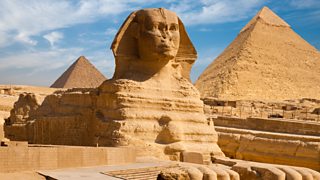
The protagonist of Oedipus the King – Anthony Burgess's drama based on Sophocles – must face the Sphinx and solve a riddle to save his life.
Riddles are puzzles which require lateral thinking and linguistic ingenuity to solve.
Generally intended as entertainment, in fictional situations they do often become a matter of life and death.
Here are six conundrums to grapple with. Try not to forfeit your life...
1. The Riddle of the Sphinx

Poor Oedipus leads a life doomed by the Gods. Abandoned to die by his father King Laius of Thebes, in order to thwart a prophecy, Oedipus is found by shepherds and raised by foster-parents, the King and Queen of Corinth. The Oracle at Delphi prophesies that Oedipus will end up killing his father and marrying his mother. Thinking this means his foster-parents, he sets off for Thebes. On the way he meets an older man: they quarrel and Oedipus kills him. Continuing on his way, Oedipus learns that King Laius has recently been slain and that the city stands threatened by the Sphinx: it bars the road and will kill and eat anyone who cannot solve a riddle. No-one has ever succeeded, but Oedipus solves it. Can you?
What goes on four feet in the morning, two feet at noon, and three feet in the evening?
Click here for the answer
The answer is “man”: in childhood he creeps on hands and knees, in manhood he walks upright, and in old age he walks with the aid of a stick.
Although Oedipus defeats the Sphinx, his victory is short-lived. He wins the throne of Thebes which comes with the hand of the king’s widow, Jocasta. The story plays out when Oedipus discovers that the man he killed on the road was his father, Laius. Jocasta, realising that she has married her own son and her husband’s murderer, commits suicide. Oedipus blinds himself.
2. Riddling back in time...
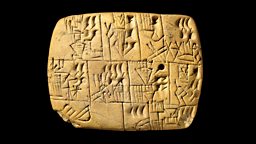
One of the oldest known riddles comes from the ancient civilisation of Sumer in Mesopotamia – present-day southern Iraq – where “picture-writing” on tablets was invented well before 3000 BC. Among these early writings some riddles were discovered. Here’s one:
There is a house. One enters it blind and comes out seeing. What is it?
Click here for the answer
No, it's not an eye hospital, the house is a school.
3. The President's Riddle
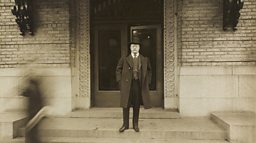
Theodore Roosevelt Jr. (1858-1919) was an American polymath who served as the 26th President of the United States, from 1901 to 1909. He is said to have enjoyed this riddle:
I talk, but I do not speak my mind
I hear words, but I do not listen to thoughts
When I wake, all see me
When I sleep, all hear me
Many heads are on my shoulders
Many hands are at my feet
The strongest steel cannot break my visage
But the softest whisper can destroy me
The quietest whimper can be heard.
Click here for the answer
“I am an actor.”
4. Riddles of the Ice Maiden
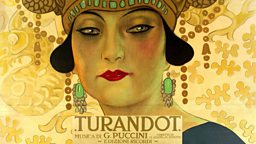
The central character in Puccini's opera Turandot is a devastatingly beautiful Chinese princess with, unfortunately, a heart of ice. Her self-esteem is off-the-scale, compelling her to demand that any potential suitor must solve three riddles, or forfeit his life. The opera opens with the execution of the latest prince who has failed to make the grade. However, one more handsome prince, who will not reveal his name, steps forward to accept the challenge.
Here are the three riddles: see if you can solve them. When you click for the answers, you'll find there's a twist in the tail.
1) What is born each night and dies at dawn?
2) What flickers red and warm like a flame, yet is not fire?
3) What is like ice yet burns?
Click here for the answers
The answers are:
1) Hope
2) Blood
3) Turandot
Athough the third riddle is kind of a trick question, the prince, whose name is Calaf, gives the right answers. Turandot is outraged, and refuses to go through with her side of the bargain. Calaf takes another gamble: he offers her a challenge – if Turandot can learn his name by dawn, he will forfeit his life.
The courtiers and citizenry set about trying to find out Calaf's name. His friend Liù is captured and tortured, but she will not reveal it. When asked why, she says it is because of her love for him. Liù kills herself.
At daybreak, Turandot confronts Calaf, who reveals his name. Turandot tells the crowd, "His name is… Love". She then concedes defeat and the ice melts...
5. Gollum v. Bilbo Baggins
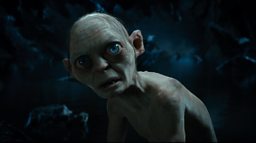
Gollum is a malevolent character who appears in J R R Tolkien's fantasy novels, The Hobbit and The Lord of the Rings. He is a hobbit whose mind and body have been corrupted and twisted by centuries of exposure to the evil aura of the Ring. In The Hobbit, the hero Bilbo Baggins encounters Gollum: the ensuing riddle tournament is set to determine whether Gollum will show Bilbo the way to escape from a tunnel, or eat him for dinner. Here's one of the riddles which Bilbo has to solve:
This thing all things devours;
Birds, beasts, trees, flowers;
Gnaws iron, bites steel;
Grinds hard stones to meal;
Slays king, ruins town,
And beats mountain down.
Click for the answer
The answer is "time". Bilbo's winning question isn't a riddle at all, but a straightforward question: "What have I got in my pocket?" Gollum is stumped: if only he could have guessed that the answer would have brought the end of his quest to find his Preciousssss... the Ring!
6. Will he choose wisely?
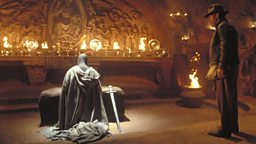
The climax of Steven Spielberg's 1989 action adventure movie, Indiana Jones and the Last Crusade, is a visual riddle. Indy, the Nazi Walter Donovan and his companion Elsa, have made their way to the chamber where the Holy Grail (a sacred chalice) is guarded by a centuries-old Grail Knight. Donovan wants the Grail to secure his own immortality. Indy needs it to heal his mortally-wounded father. The conundrum is that the real Grail is hidden in plain sight, surrounded by dozens of false Grails, which will take life instead of bestowing it. Elsa selects a solid gold, emerald-encrusted goblet. Donovan grabs it, fills it with holy water, and drinks. He shrivels to dust. "He chose poorly," remarks the Grail Knight, drily. After some deliberation, Indy makes his selection. He chooses wisely. But which one?
Click here for the answer
Indy chooses a simple, undecorated earthenware goblet. "That's the cup of a carpenter," he declares, referencing the fact that Jesus Christ was the son of a carpenter, and not overly impressed by ostentatious displays of wealth...
More Speech and Drama on Radio 3
-
![]()
Drama on 3
Drama performances, ranging from experimental works to the classics.
-
![]()
The Odyssey
The opening of Chapman's translation of Homer’s "The Odyssey", read by Claire Higgins.
-
![]()
The Woman Who Loved Too Much
The story of Puccini's Madama Butterfly, in eight pictures.
-
![]()
The Essay: Being Orson
Commentaries about the great actor, film director, radio producer and impresario.




